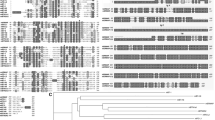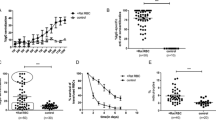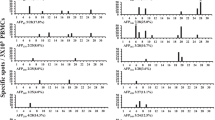Abstract
α-FOETOPROTEIN (AFP), an embryo-specific glycoprotein, is primarily known as a tumour-associated embryonic antigen. Although much is known about the occurrence of AFP in ontogeny and levels of AFP in different diseases, such as hepatocellular carcinoma and other tumours1–4, little work has been done on its functional significance. Results from our laboratory have shown that AFP exerts an immunosuppressive effect on antibody synthesis when administered in vivo5 and that it is a non-cytotoxic suppressor of both the primary and secondary antibody response to sheep red blood cells (SRBC) in vitro6. In addition, we found that AFP suppresses certain T-cell-dependent functions in mice such as allogeneic and mitogeninduced lymphocyte transformation7. A recent report8 suggests that bovine foetuin is immunosuppressive for mitogen and allogeneic reactions. Bovine foetuin and AFP have, however, been shown to be different proteins9. Moreover, in view of the relatively large amounts of foetuin used to obtain suppression (10,000-fold higher than those required for suppression in our studies using AFP), it is possible that the foetuin preparations were contaminated with suppressive amounts of bovine AFP.
This is a preview of subscription content, access via your institution
Access options
Subscribe to this journal
Receive 51 print issues and online access
$199.00 per year
only $3.90 per issue
Buy this article
- Purchase on Springer Link
- Instant access to full article PDF
Prices may be subject to local taxes which are calculated during checkout
Similar content being viewed by others
References
Abelev, G. I., Transplant. Rev., 20, 3–37 (1974).
Abelev, G. I., Adv. Cancer Res., 14, 295–358 (1971).
Kew, M., Gut, 15, 814–821 (1974).
McIntire, K. R., Waldmann, T. A., Moertel, C. G., and Go, V. L. W., Cancer Res. (in the press).
Ogra, S. S., Murgita, R., and Tomasi, T. B., Immun. Commun., 3, 497–508 (1974).
Murgita, R., and Tomasi, T. B., J. exp. Med., 141, 269–286 (1975).
Murgita, R., and Tomasi, T. B., J. exp. Med., 141, 440–452 (1975).
Yachnin, S., J. exp. Med., 141, 242–256 (1975).
Kithier, K., and Poulik, M. D., Biochim. biophys. Acta, 278, 505–516 (1972).
Stobo, J. D., Rosenthal, A. S., and Paul, W. E., J. Immun., 108, 1–17 (1972).
Julius, M. H., Simpson, E., and Heryenberg, L. A., Eur. J. Immun., 3, 645–649, (1973).
Ryder, R. J. W., and Schwartz, R., J. Immun., 103, 970–978 (1969).
Cough, J. D., Mims, L. H., and Strober, W., J. Immun., 106, 1624–1629 (1971).
Arnason, B. G., DeVoux St Cyr, C., and Relyveld, E.H., Int. Archs Allergy appl. Immun., 25, 206–224 (1964).
Author information
Authors and Affiliations
Rights and permissions
About this article
Cite this article
DATTWYLER, R., MURGITA, R. & TOMASI, T. Binding of α-foetoprotein to murine T cells. Nature 256, 656–657 (1975). https://doi.org/10.1038/256656a0
Received:
Accepted:
Issue Date:
DOI: https://doi.org/10.1038/256656a0
This article is cited by
-
Growth inhibition of human liver cancer cells by alpha-fetoprotein antisense strategy
In Vitro Cellular & Developmental Biology - Animal (1999)
-
Schwangerschaftsspezifische und schwangerschaftsassoziierte Proteine in der Diagnostik und Verlaufskontrolle maligner Erkrankungen
Klinische Wochenschrift (1978)
-
Immunosuppression by mouse sialylated α-foetoprotein
Nature (1977)
-
Localization and synthesis of α-fetoprotein in the chicken
Cell and Tissue Research (1977)
Comments
By submitting a comment you agree to abide by our Terms and Community Guidelines. If you find something abusive or that does not comply with our terms or guidelines please flag it as inappropriate.



